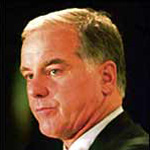 Instant Change
Instant ChangeCary voters will cast a new kind of ballot in town elections. And if a runoff is needed, ballots will be counted differently too
Supreme Court Justice Louis Brandeis argued in 1932 that the states should be free to be laboratories of democracy. Municipalities, by that metaphor, are the labs' test tubes -- and now the Town of Cary has lit the Bunsen burner.
By approving "instant runoff" elections for municipal elective offices, the Town Council last week took a surprisingly bold approach, the first of its kind in North Carolina. The new system, approved on a 4-to-3 vote with no public hearing, may lower some election-related expenses but add to voter confusion. We'll get a better reading this fall, after elections for mayor and three of the six council seats in the "town" that's actually North Carolina's seventh-largest city.
Since 2001, Cary has held its municipal elections -- they're nonpartisan -- in October in odd-numbered years. If there was no clear winner, a runoff was held in November. Now there will be only one election, this year on Oct. 9. That potentially saves taxpayers $60,000 or so, and avoids some extra campaigning. And having only one election eliminates the possibility, or probability if you will, of an embarrassingly low turnout for the second round.
Now, what's instant runoff voting? In effect, it's two elections in one, if need be. Here's how the town Web site describes the setup:
"Instead of voting for a single candidate for each office, voters rank all of the candidates running for an office in order of preference. If no candidate receives a majority of first preference votes, then the two candidates with the most first preference votes enter the Instant Runoff; all other candidates are eliminated.
"The ballots having selected the eliminated candidates are then reviewed, and their second preference votes are tallied. All second preference votes for the two candidates in the runoff are then added to their existing first preference votes. The runoff candidate with the highest number of first and second preference votes is declared the winner."
Judging by other descriptions of the process, however, a voter wouldn't be required to rank all candidates -- she could pick only her favorite and the ballot would still count. And would the tallying of a voter's preferences really stop at No. 2? If so, why rank beyond that?
Clearly, no short description can answer all the questions voters may raise about a system so at odds with longtime U.S. practices in casting and counting public election ballots. And although electoral experiments aren't unknown in Cary -- the town once tried its own campaign finance plan -- it's a bit surprising to find Republican-leaning Cary in company with blue-tinged San Francisco, Burlington, Vt., and Takoma Park, Md., as an early adapter of instant runoffs in municipal elections.
Perhaps that's why Mayor Ernie McAlister voted against the change, saying "This system is inherently flawed ... I see it as a violation of the spirit of our elections." Then, apparently donning his civic-duty, put-the-best-face-on-it cap, the mayor came back with "Cary has always been on the forefront of innovative projects like this ... our staff will work diligently with the [Wake County] Board of Elections to comprehensively educate our citizens on this new initiative."
That education process is important. Voters will want to learn not only about the candidates but about instant runoff voting itself. Under the enabling legislation passed by the General Assembly, Cary's switch is part of a time-limited "pilot" program. Let the experiment begin -- but analyze the results with care.
 On March 16th, Former Vermont Governor and Democratic National Committee Chair Howard Dean continued his support for instant runoff voting on Vermont Radio's Mark Johnson Show. Commenting on Burlington's recent IRV election, Dean said "I think the best and most democratic way to use to elect people in multiparty elections is instant runoff voting." Dean also supported the system when it was first used in Burlington in 2006.
On March 16th, Former Vermont Governor and Democratic National Committee Chair Howard Dean continued his support for instant runoff voting on Vermont Radio's Mark Johnson Show. Commenting on Burlington's recent IRV election, Dean said "I think the best and most democratic way to use to elect people in multiparty elections is instant runoff voting." Dean also supported the system when it was first used in Burlington in 2006. Citizens of Burlington, Vermont went to the polls on Tuesday, March 3rd to vote for the second time in an election using instant runoff voting. At 8:25 PM, the city declared that incumbent Mayor Bob Kiss had won reelection in the third and final round of counting, narrowly edging out challenger Kurt Wright, 51.5% to 48.5%. The race was unique in that it had four candidates that had a legitimate shot at winning: Progressive Kiss, Republican Wright, Democrat Andy Montroll, and independent Dan Smith. In most other American cities, there would be fear of "spoiler" candidates, but IRV allowed all four candidates to run without having to worry about being labeled "spoilers."
Citizens of Burlington, Vermont went to the polls on Tuesday, March 3rd to vote for the second time in an election using instant runoff voting. At 8:25 PM, the city declared that incumbent Mayor Bob Kiss had won reelection in the third and final round of counting, narrowly edging out challenger Kurt Wright, 51.5% to 48.5%. The race was unique in that it had four candidates that had a legitimate shot at winning: Progressive Kiss, Republican Wright, Democrat Andy Montroll, and independent Dan Smith. In most other American cities, there would be fear of "spoiler" candidates, but IRV allowed all four candidates to run without having to worry about being labeled "spoilers." On April 4, Vermont governor Jim Douglas chose to veto legislation to re-establish majority elections for Congress in his state through instant runoff voting. Vermont would have been the first state to enact IRV for Congress; legislative leaders affirmed their commitment to the bill, and it is sure to move in the state again. FairVote has worked hard to support this legislation, which likely generated more than 600 phone calls to the governor from Vermonters.
On April 4, Vermont governor Jim Douglas chose to veto legislation to re-establish majority elections for Congress in his state through instant runoff voting. Vermont would have been the first state to enact IRV for Congress; legislative leaders affirmed their commitment to the bill, and it is sure to move in the state again. FairVote has worked hard to support this legislation, which likely generated more than 600 phone calls to the governor from Vermonters.